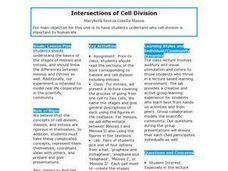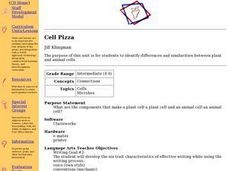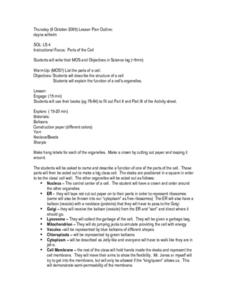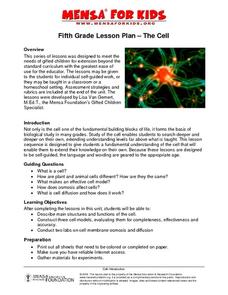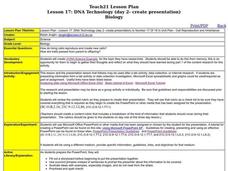Curated OER
Intersections of Cell Division
Learners listen to a lecture covering the process of going from one cell to two cells. Using the textbook, students differentiate between meiosis I and Meiosis II. Learners work in pairs to create one stage using pipe cleaners, sequins,...
Curated OER
Antibodies and the Immune Response Lesson Plans - Biology Teaching Thesis
Students are introduced to bacteria and their role in biology and finishes with a lab experiment that focuses on antibiotics. They are given an overview of the important concepts involving bacteria and their potential resistance to...
Curated OER
How Do Cells Reproduce?
Students discuss the importance of reproduction of cells. They identify and describe the stages of Mitosis. They discover what happens to chromosomes and DNA during reproduction.
Curated OER
2D Concept Visualization: Cell Organelles Presentation
Students create simple 2D concept driven visualizations of cells and cell organelles and organize them into an effective presentation.
Curated OER
Cell Pizza
Students identify parts and functions of microscope. Students watch video, Cells and Life about cell parts with actual pictures and actual cells. Students discuss video and identify parts of the cells that animals and plants have in...
Curated OER
WHAT IS A CELL?
Students explore the function and structures of cells, including plant and animal cells. They explore cell parts including cell wall, ribosomes, chromosomes, nucleoid, plasmids, flagella, pilli, and plasma membrane, cel
Curated OER
Mobile Phones
Investigate how mobile phones impact their lives through this technology instructional activity that has students discuss the history of the cell phone and research how cell phones are being used in third world countries. Students create...
Curated OER
Extensions - Biology Review Unit
Students engage in a variety of activities in order to review a Biology unit. For example, they research the Bird Flu, it's history, how it is spread, what has been done about it, what better options exist for controlling or removing it....
Curated OER
Parts of the Cell
High schoolers examine plant and animal cells to observe the organelles present in the cell, to match the function of each to the organelle on a cell model and to build a model of the plant or animal cell.
Teach Engineering
The Keepers of the Gate Challenge
Help your class make a connection between salt water and nanoscience. In the introductory lesson of a seven-part unit, the class explores why salt water helps a sore throat feel better. Pupils conduct preliminary research about the...
Curated OER
Seeing Cells
Students discuss what comes to mind when they hear the term cell and discuss what a cell is in biological terms. They look at pictures of cells and color a picture of a cell diagram, writing the job of each part as they go. After the...
Curated OER
The Cell
Tenth graders explore the parts of a cell. In pairs, classmates construct a model of a eukaryotic cell, detailing its morphology and function. With the use of computer technology, 10th graders create cell book for middle schoolers. ...
Curated OER
Cell Structure And Function
In this biology worksheet, students respond to 13 multiple choice questions related to cell structure and function. They identify which are microfilamets and which have a cell wall. Students also describe what chloroplasts are and their...
Curated OER
Cell Cycle Duration
Learners examine the cell cycle and how its duration can vary. In this cells lesson students complete a worksheet and answer questions.
Biology Corner
Cell Theory Rap
All that this will link you to is a rap about cell theory and organelles. Use it as an example for a creative assignment in your biology class. Divide the class into groups and assign them a topic for which they write and perform a skit,...
Curated OER
The Case of Regulation in Cells
After your biologists have learned about transcription, translation, and gene regulation, they work in a small group to create a poster of a system that serves as an analogy of the gene regulation process. They share their creations with...
Illustrative Mathematics
How Many Cells Are in the Human Body?
Investigating the large numbers of science is the task in a simple but deep activity. Given a one-sentence problem set-up and some basic assumptions, the class sets off on an open-ended investigation that really gives some context to all...
Curated OER
Seeing Cells
Sixth graders study living cells and their functioning units. In this cell lesson students color cell diagrams, answer questions and discuss the differences between plant and animal cells.
Curated OER
The Great Archeological Dig
Students explore biology by identifying a diagram. In this cell anatomy instructional activity, students read a story about archeology and conduct a fictitious archeology dig in class in which they search for animal cells. Students...
Pace University
Grade 6-8 Living Things
What characterizes a living thing? Scholars explore the concept during a differentiated instruction unit on living things. They perform lab experiments to determine how animals adapt to stimuli, watch videos and learn about...
Curated OER
Enhancing Uptake of Glucose in Rabbit Muscle Cells
Students observe diffusion of glucose through a cell membrane and research the function of chromium picolinate in glucose uptake into a cell. They conclude and understand the role of insulin and chromium picolinate in the uptake of...
Curated OER
Cell-ebrations in Science
Students recognize that all living things are made up of cell and that they cannot easily be seen by the naked eye. Students become familiar with the use of microscopes as a tool for investigation.
Curated OER
Games and Activities to Teach Molecular Genetics
Students demonstrate a working knowledge of cell interactions such as DNA replication, protein synthesis (transcription and translation), through active participation in a cooperative group.
Curated OER
DNA Technology
Students prepare PowerPoint presentation on DNA and cells. For this biology lesson, students create a storyboard of their presentation. They share the finished project in class.


